Can the Republicans win black votes in 2016?
- Published
- comments
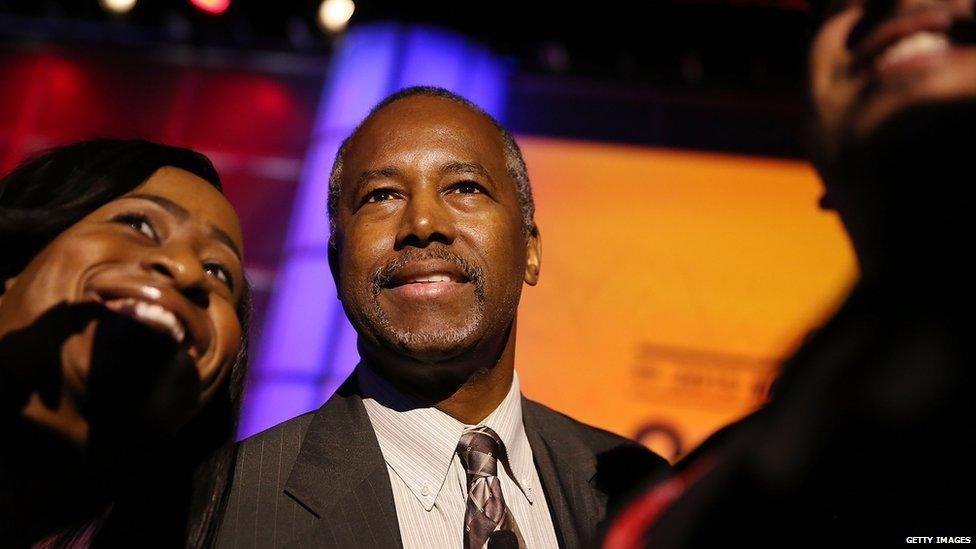
Jeb Bush and Ben Carson (centre) were the only two Republicans at the Urban League forum on Friday
If demographics are destiny, as the 19th-century French sociologist Auguste Comte once said, the Republican Party is in trouble.
Minorities are becoming an increasingly larger portion of the population that votes in US presidential elections, and those voters overwhelmingly support Democrats.
The numbers speak for themselves. In 2012 Republican candidate Mitt Romney won 17% of the non-white vote - Hispanics, blacks, Asians and others - and 59% of the white vote.
Thanks to population changes in the last four years, if the 2016 Republican nominee maintained that non-white percentage, he or she would have to win about 64% of the white vote, according to Republican pollsters Glen Bolger and Neil Newhouse, external - a seemingly insurmountable margin.
The last Republican to win a presidential election, George W Bush in 2004, carried 58% of the white vote and 26% of the non-white vote. In 2016 those would be losing numbers.

At the Scene, Anthony Zurcher Fort Lauderdale, Florida
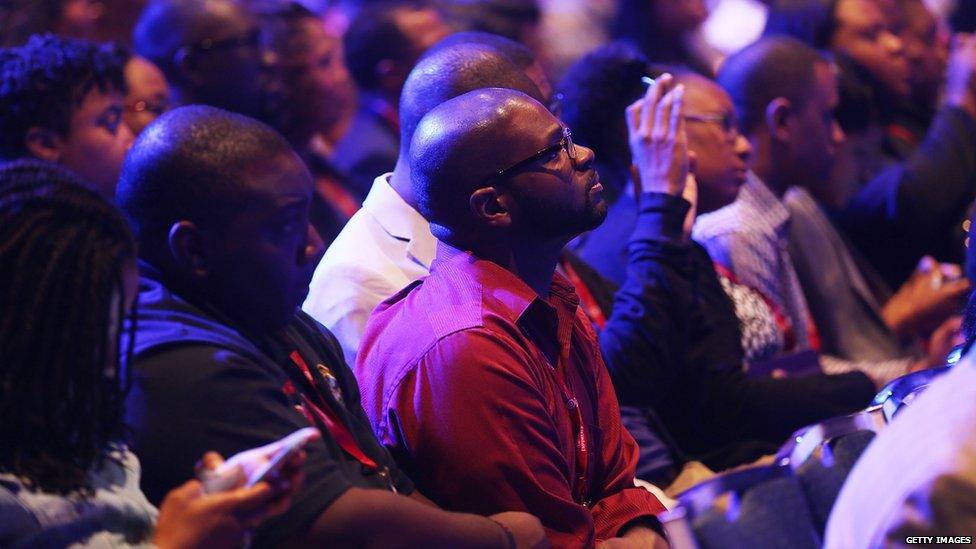
Attendees listen to Hillary Clinton talk at the Urban League's presidential forum
At the National Urban League's presidential forum, the audience favourite was former Secretary of State Hillary Clinton - and she seemed to feed on the crowd's energy.
If there were some concern that Democrats have been taking the black vote for granted, she wanted the community to know that "your issues are deeply personal to me".
"The real test of a candidate's commitment is not if we come to speak at a national conference, as important as that is, it's whether we're still around after the cameras are gone and the votes are counted."
Republican presidential hopeful Jeb Bush received polite applause throughout his address.
Unlike Mrs Clinton and the other Democrats who spoke today, he gets points just for showing up before this audience. Most of the other Republicans didn't - only Mr Bush and Ben Carson attended.
He noted his defeat during his first run for governor in 1994 as a key turning point that has made him more sensitive to the concerns of the black community.
"I went through what some people might call self-reflection - I call living and learning," he said.

When political analysts and strategists talk about Republican efforts to reach out to minority voters, the focus of late largely has been on Hispanics. They represent the largest, fastest-growing block of the non-white electorate - 10% of the electorate in 2012 - and they are perceived to be more open to a conservative message, external because of studies showing them to be more religious, with a high value on tight-knit families.
The politics of the immigration issue - including border security and the status of undocumented workers - have complicated the Republican pitch, however. Candidates like Donald Trump, with his now-infamous line about Mexico sending "criminals, drug dealers, rapists, etc" to the US, are taking hard line positions that some fear could alienate Hispanic voters.
"All the Latino friendly Republican candidates in the world may be unable to repair the damage done by a primary that seems set to turn on antipathy toward Hispanic immigrant culture," writes Noah Rothman in an essay in Commentary magazine.
As another option, he argues, Republican candidates should try to make inroads in a voting segment that has turned out in record numbers and voted overwhelmingly for the Democrat in the past two presidential elections - blacks.
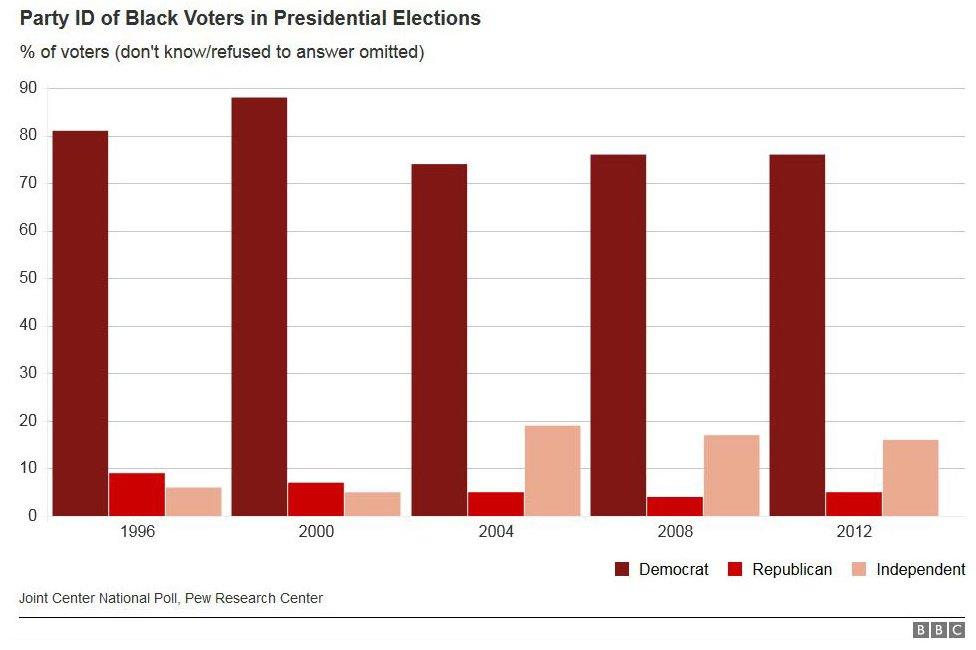
That Democrat on the ballot in 2008 and 2012, of course, was Barack Obama - and his status as the first black US president likely explains much of the enthusiasm and support for his campaign.
Mr Obama isn't running in 2016, however, leading Rothman to argue that the black vote represents an "untapped well" for Republicans.
"If Republicans were even modestly successful in appealing to African-Americans, it would make winning elections substantially more difficult for Democratic politicians," he writes.
This may explain why Republican candidates like former Florida Governor Jeb Bush, Kentucky Senator Rand Paul and former Texas Governor Rick Perry are leavening their speeches with talk of broadening their party's appeal and advancing issues they believe will attract blacks voters.
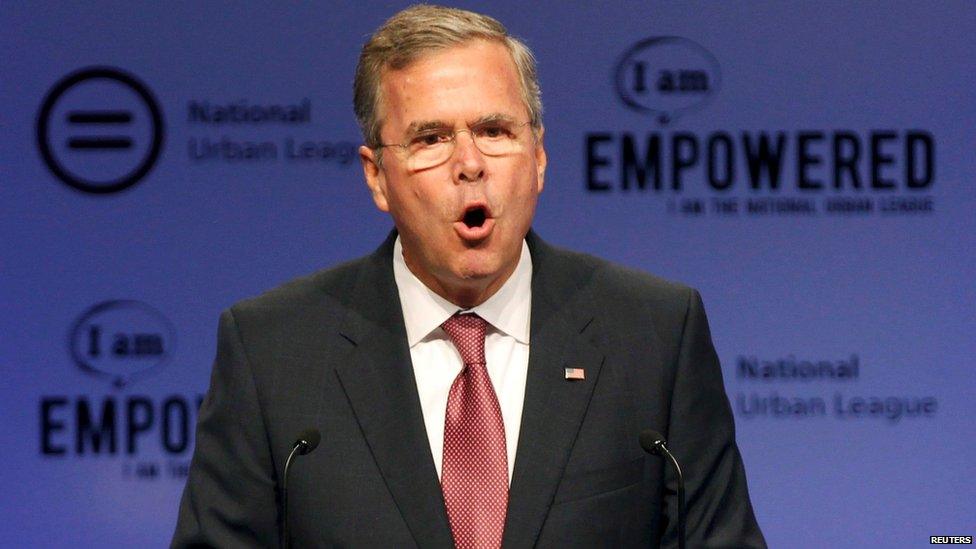
Jeb Bush speaks at the Urban League
Mr Paul, for instance, calls for creating low-tax, low-regulation "economic freedom zones" in black neighbourhoods, restoring voting rights for convicted felons and reforming a federal prison sentencing system that has been criticised as being unfair to blacks.
Mr Bush has pledged to campaign in places where Republicans rarely appear, such as inner cities and black churches.
"I want to be the candidate who goes into the African-American community and says: 'Join our team because our values are the ones that you share'," Mr Bush said, external recently in New Hampshire.
In a speech , externalin early July, Mr Perry asserted that Republicans were in part to blame for their party's lack of black support by placing too much emphasis on states' rights.
"There has been, and there will continue to be an important and a legitimate role for the federal government in enforcing civil rights," he said. "When we gave up trying to win the support of African-Americans, we lost our moral legitimacy as the party of Lincoln, as the party of equal opportunity for all."
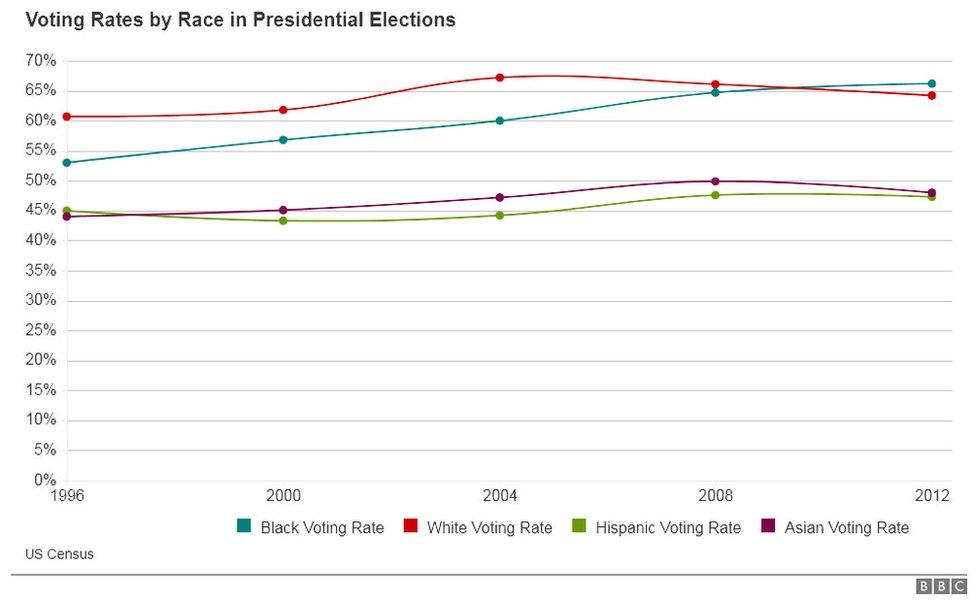
On Friday Mr Bush - along with fellow Republican Ben Carson, the only prominent black candidate for either party, and Democrats Hillary Clinton, Martin O'Malley and Bernie Sanders - will travel to Fort Lauderdale, Florida, to address the annual conference of the National Urban League, a black civil rights organization. Mr Paul was a keynote speaker at its 2014 gathering.
At the conference on Thursday, attendees and speakers grappled with the upcoming 2016 election and the role that black voters will play. Some of the talk could prove encouraging for Republicans.
"We are a part, as black voters, of a coalition that we've given everything to and can't ask anything from," Van Jones, an environmental activist, lawyer and former Obama adviser, said during a panel on the presidential race. "As long as that's our position, we're going to continue to be mistreated within our own party."
Blacks have been supportive of other Democratic priorities, such as immigration reform, the environment and gay rights, but are being ignored on matters that concern their communities.
"The Obama era of black silence on issues that are important to us is over," he said.
That doesn't necessarily mean good news for conservatives, however. Fellow panellist Angela Rye, a political strategist and former executive director of the Congressional Black Caucus, said after the session that she's seen little from the current crop of Republicans that will appeal to black voters.
"Black folks shouldn't be beholden to the Democratic Party, they should be beholden to their interests," she said. "To me, however, the Republicans are style over substance. Anybody can come up with a good talking point or two. I'd love to see what their real agenda looks like."
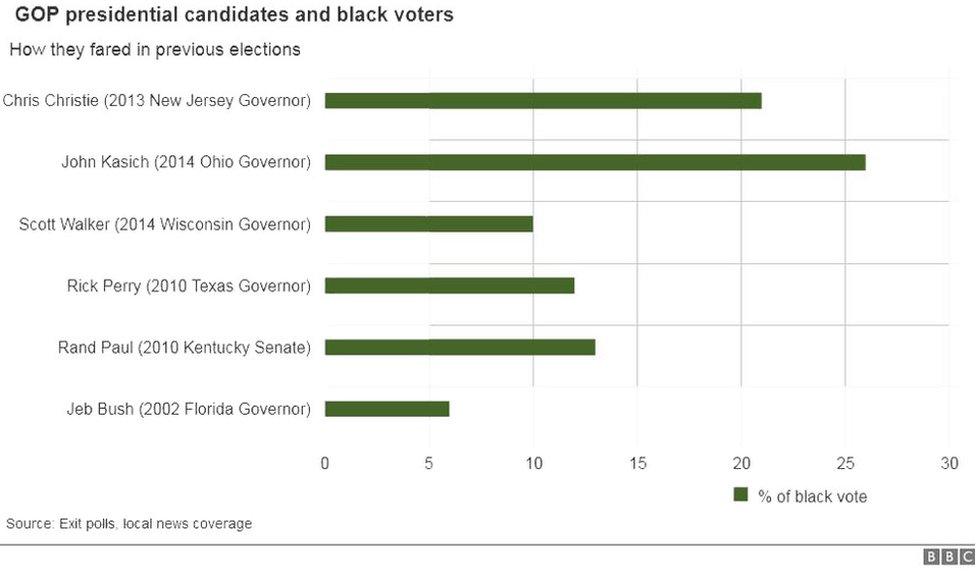
These spilt sentiments - a dissatisfaction with the Democratic response to black issues but a lack of trust in a viable Republican alternative - were echoed among many convention attendees.
Ludlow Bailey of Miami said that while Mr Bush was "a balanced guy" and a smart politician, his attempts to reach out to the black community were being drowned out by candidates like Mr Trump.
"Donald Trump is really screwing it up for Republicans," he said, adding that it was not just Hispanics who were being put off by his brash style.
If the black community is in turmoil, that could represent a rare opportunity for Republican candidates to tip the balance a bit more in their favour for the first time in more than a generation.
Toward the end of the day on Thursday, the Reverend Al Sharpton - a long time black activist who has a reputation for brashness himself - pointed out that in 2016 Americans will elect the first white president to follow a black president.
"The bar has been raised higher than it has been before," he said. "After Obama you can not get away with what you got away with before."
That is an opportunity and a challenge - for Republicans and Democrats alike.
- Published15 July 2015
- Published30 June 2015
- Published4 June 2015